

John Dennys (died 1609), a poet and fisherman, pioneered Angling poetry in England. His only work The Secrets of Angling was the earliest English poetical treatise on fishing. John Dennys may have been an acquaintance of Shakespeare.


John Dennys (died 1609), a poet and fisherman, pioneered Angling poetry in England. His only work The Secrets of Angling was the earliest English poetical treatise on fishing. John Dennys may have been an acquaintance of Shakespeare.
John Dennys was son of Hugh Dennis (died 1559) [1] [2] [nb 1] of "Plucherchurch" and Katherine, daughter of Thomas Trye of Hardwicke, Gloucestershire. [3] [4] [nb 2] [nb 3] [2] [nb 1] Hugh's father John had been the heir of Hugh Denys of Osterley, Middlesex (died 1511), Groom of the Stool to Henry VII. [8] [9] [nb 4] John's elder brother Henry, died without having fathered any children. [2] [4] [nb 1]

His only work The Secrets of Angling was the earliest English poetical treatise on fishing. [11] [nb 5] In it he wrote of a brook, River Boyd, formed from streams in his hometown of Pucklechurch, which met downstream with the River Avon: [1]
It was first published in 1613. [12] [13] Dennys's book was published after his death, the author identified by the initials J.D., and had been attributed to up to 6 poets. In 1811 the authorship was determined from Stationers' Registers, which showed that Dennys authored the book. [1]
A didactic pastoral poem in 3 books, totalling 151 verses each of 8 lines, in the style of Virgil's Georgics, it was published in 4 editions until 1652, examples of which are amongst the rarest books in existence. [13] Verses from the book have been quoted in other works, [14] such as Izaak Walton in the first part of the first chapter of his 1653 edition of The Compleat Angler . [15] [nb 6]
Dennys received at the hand of Thomas Westwood (1814–1888), the epithet "The Fisherman's Glorious John". [16] The appellation was received from Walter Scott. [17]
He married Eleanor, daughter of Thomas Millett of Warwickshire [3] [4] [nb 7] and had the following children: [2] [nb 1]
Between 1572 and 1608, he was the lord of the manor at Oldbury-sur-Montem, Pucklechurch, Glocestershire. [1] [3] [21] He had other places in the same county. [3]
Rev. Henry Nicholson Ellacombe wrote Shakespeare as an Angler, in which he argues that The Bard and John Dennys (Dennis) may have known each other. William Shakespeare lived for a while at Dursley, not too far from Dennys's manor of Oldbury-on-Hill, north of Pucklechurch. [21] [22]
He died 30 July 1609[ citation needed ] and was buried 7 August 1609 at the ancient Pucklechurch, [3] [19] [nb 9] The family was buried in the Pucklechurch's "ancient" church on the north aisle. [1] [3] John Dennys's will was dated 1609, without month, proved 14th. Oct. 1609. [23]
Thomas Westwood wrote the following epitaph for John Dennys:
Calm be his sleep in the old aisle of Pucklechurch! or if any sound reach him from the outer world, may it be only the soughing of the sweet south wind, and the ripple of Boyd, that with "crooked winding way" past cliff and meadow, "Its mother Avon runneth soft to seek". [24]

Izaak Walton was an English writer. Best known as the author of The Compleat Angler, he also wrote a number of short biographies including one of his friend John Donne. They have been collected under the title of Walton's Lives.
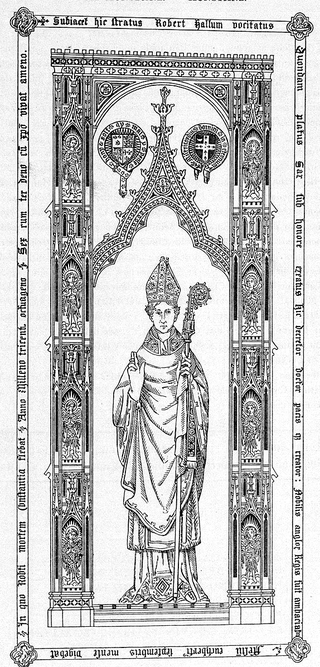
Robert Hallam was an English churchman, Bishop of Salisbury and English representative at the Council of Constance. He was Chancellor of the University of Oxford from 1403 to 1405.

John Still was Master of two Cambridge colleges and then, from 1593, Bishop of Bath and Wells. He enjoyed considerable fame as an English preacher and disputant. He was formerly reputed to be the author of an early English comedy drama, Gammer Gurton's Needle.

The Ellacombe apparatus is a mechanism devised for performing change ringing on church bells by striking stationary bells with hammers. It does not produce the same sound as full circle ringing due to the absence of Doppler effect as the bells do not rotate, and the lack of a damping effect from the clapper after each strike.

Pucklechurch is a large village and civil parish in South Gloucestershire, England. It has a current population of about 3000. The village dates back over a thousand years and was once the site of a royal hunting lodge, as it adjoined a large forest.
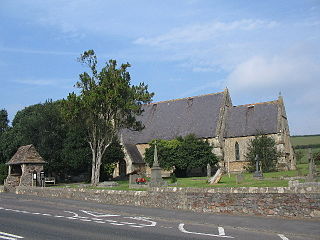
Wick is a village in South Gloucestershire, England. It is the main settlement in the civil parish of Wick and Abson. The population of this civil parish taken at the 2011 census was 1,989.
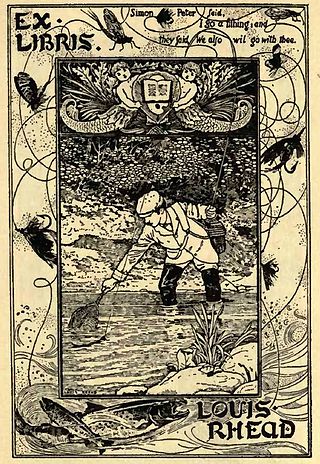
This general annotated bibliography page provides an overview of notable and not so notable works in the English language regarding the sport of fly fishing, listed by year of first publication. Although not all the listed books are devoted exclusively to fly fishing, all these titles contain significant fly fishing content. The focus of the present page is on classic general texts on fly fishing and its history, together with notable public or university library collections dedicated to fly fishing.

A Concise Treatise on the Art of Angling- Confirmed by Actual Experiences and Minute Observations to Which is Added the Compleat Fly-Fisher is a fly fishing book written by Thomas Best, first published in London in 1787.

The River Boyd is a river of some 7 miles (11 km) in length which rises near Dodington in South Gloucestershire, England. It is a tributary of the Bristol Avon, running in a southerly direction and joining near Bitton. The flow rate at Bitton is an average 19.8 cubic feet per second (0.56 m3/s). It was immortalised in the 1613 poem by John Dennys of Pucklechurch The Secrets of Angling, the earliest English poetical tract on fishing:
And thou sweet Boyd that with thy watry sway
Dost wash the cliffes of Deington and of Weeke
And through their Rockes with crooked winding way
Thy mother Avon runnest soft to seeke
In whose fayre streames the speckled Trout doth play
The Roche the Dace the Gudgin and the Bleeke
Teach me the skill with slender Line and Hooke
To take each Fish of River Pond and Brooke.
Hugh Denys of Osterley in Middlesex, was a courtier of Kings Henry VII and of the young Henry VIII. As Groom of the Stool to Henry VII, he was one of the King's closest courtiers, his role developing into one of administering the Privy Chamber, a department in control of the royal finances which during Denys's tenure of office also gained control over national fiscal policy. Denys was thus a vital player in facilitating the first Tudor king's controversial fiscal policies.
Sir Gilbert Denys of Siston, Gloucestershire, was a soldier, and later an administrator. He was knighted by January 1385, and was twice knight of the shire for Gloucestershire constituency, in 1390 and 1395 and served as Sheriff of Gloucestershire 1393-4. He founded the family which provided more Sheriffs of Gloucestershire than any other.
Thomas Playfere was an English churchman and theologian, Lady Margaret's Professor of Divinity at Cambridge from 1596.
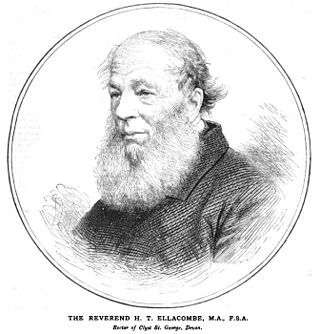
Henry Thomas Ellacombe or Ellicombe (1790-1885), was an English divine and antiquary. He was the inventor of an apparatus to allow a single ringer to ring multiple bells.
Thomas Barker (fl.1591–1651) was an English fishing guide and author.

Henry Dennis was High Sheriff of Gloucestershire in 1629. He was lord of the manor of Pucklechurch, Gloucestershire. The Dennis family produced more Sheriffs of Gloucestershire than any other family. Like many members of the Gloucestershire gentry he refused to take a knighthood at the coronation of King Charles I in 1625, for which he paid a composition of £25.
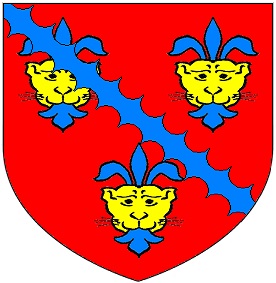
The Denys family of Siston, also spelled Dennis, originally came from Glamorgan in Wales and in the late 14th century acquired by marriage the manor of Siston, Gloucester and shortly thereafter the adjoining manor of Dyrham. Maurice Denys re-built Siston Court in the 16th century.

The Secrets of Angling was a book written by John Dennys. It was the earliest English poetical treatise on fishing, first published in 1613 in London. A didactic pastoral poem in 3 books, in the style of Virgil's Georgics. It was published in 4 editions until 1652, examples of which are amongst the rarest books in existence.
Henry Nicholson Ellacombe (1822–1916) was a British plantsman and author on botany and gardening.

Edward Cary or Carey or Carye was an English courtier and Master of the Jewel Office for Elizabeth I and James VI and I.
{{cite book}}: CS1 maint: multiple names: authors list (link)